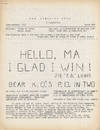
The Observational Case for a Low Density Universe With a Non-Zero Cosmological Constant in Nature 377, No. 6550, October 19, 1995, pp. 600-602
by Ostriker, J. P. and Steinhardt, P. J
- Used
- Paperback
- first
- Condition
- See description
- Seller
-
West Branch, Iowa, United States
Payment Methods Accepted
About This Item
London: Macmillan, 1995. 1st Edition. FIRST EDITION IN ORIGINAL WRAPS OF OSTRIKER & STEINHARDT'S CASE FOR A POSITIVE COSMOLOGICAL CONSTANT DERIVED FROM THEIR META ANALYSIS. Three years later their findings were verified by supernova observations.
In "the 1990s, issues surrounding the age of the universe and new astronomical measurements of large-scale structure led scientists to propose a role for a positive cosmological constant" (History of Physics: The Wenner Collection). In this paper, Jeremiah (Jerry) Paul Ostriker and Paul J. Steinhardt make their case based on a much broader array of observational data than had yet been accomplished.
Ostriker and Steinhardt argue that "observations are providing progressively tighter constraints on cosmological models advanced to explain the formation of large-scale structure in the Universe" (Ostriker & Steinhardt, 1995, 600). By reviewing the current observational constraints, then, they show those constraints "can work in concert to determine the theoretical framework and parameters that describe our universe" (Bahcall, Unsolved Problems in Astrophysics, 44). Using a "concordance of cosmological observations to show there must be a non-zero dark energy component today, more than 65 percent of the total energy density, sufficient to cause the expansion of the universe to accelerate (Ostriker & Steinhardt, 1995, 600). In 1998, two competing teams of astrophysicists and astronomers confirmed Ostriker and Steinhardt's finding that the expansion of the universe was accelerating rather than decelerating.
Ostriker and Steinhardt concluded their paper with an interesting, oft-cited question:"...perhaps we have already identified models which, in broad outline, capture the essential properties of the large-scale universe. Should this be the case, a challenge arises: how can we explain the non-zero value of the cosmological constant from a theoretical point of view?" (Ostriker & Steinhardt, 602). CONDITION & DETAILS: London: Macmillan. First edition in original wraps. Complete single issue. 4to. 11 x 8.5 inches (275 x 213mm). Tightly bound and bright and clean throughout. Very good condition.
In "the 1990s, issues surrounding the age of the universe and new astronomical measurements of large-scale structure led scientists to propose a role for a positive cosmological constant" (History of Physics: The Wenner Collection). In this paper, Jeremiah (Jerry) Paul Ostriker and Paul J. Steinhardt make their case based on a much broader array of observational data than had yet been accomplished.
Ostriker and Steinhardt argue that "observations are providing progressively tighter constraints on cosmological models advanced to explain the formation of large-scale structure in the Universe" (Ostriker & Steinhardt, 1995, 600). By reviewing the current observational constraints, then, they show those constraints "can work in concert to determine the theoretical framework and parameters that describe our universe" (Bahcall, Unsolved Problems in Astrophysics, 44). Using a "concordance of cosmological observations to show there must be a non-zero dark energy component today, more than 65 percent of the total energy density, sufficient to cause the expansion of the universe to accelerate (Ostriker & Steinhardt, 1995, 600). In 1998, two competing teams of astrophysicists and astronomers confirmed Ostriker and Steinhardt's finding that the expansion of the universe was accelerating rather than decelerating.
Ostriker and Steinhardt concluded their paper with an interesting, oft-cited question:"...perhaps we have already identified models which, in broad outline, capture the essential properties of the large-scale universe. Should this be the case, a challenge arises: how can we explain the non-zero value of the cosmological constant from a theoretical point of view?" (Ostriker & Steinhardt, 602). CONDITION & DETAILS: London: Macmillan. First edition in original wraps. Complete single issue. 4to. 11 x 8.5 inches (275 x 213mm). Tightly bound and bright and clean throughout. Very good condition.
Reviews
(Log in or Create an Account first!)
Details
- Bookseller
- Atticus Rare Books
(US)
- Bookseller's Inventory #
- 826
- Title
- The Observational Case for a Low Density Universe With a Non-Zero Cosmological Constant in Nature 377, No. 6550, October 19, 1995, pp. 600-602
- Author
- Ostriker, J. P. and Steinhardt, P. J
- Book Condition
- Used
- Quantity Available
- 1
- Edition
- 1st Edition
- Binding
- Paperback
- Publisher
- Macmillan
- Place of Publication
- London
- Date Published
- 1995
Terms of Sale
Atticus Rare Books
30 day return guarantee, with full refund including shipping costs for up to 30 days after delivery if an item arrives misdescribed or damaged.
About the Seller
Atticus Rare Books
Biblio member since 2010
West Branch, Iowa
About Atticus Rare Books
We specialize in rare and unusual antiquarian books in the sciences and the history of science. Additionally, we specialize in 20th century physics, mathematics, and astronomy.
Glossary
Some terminology that may be used in this description includes:
- New
- A new book is a book previously not circulated to a buyer. Although a new book is typically free of any faults or defects, "new"...
- First Edition
- In book collecting, the first edition is the earliest published form of a book. A book may have more than one first edition in...

